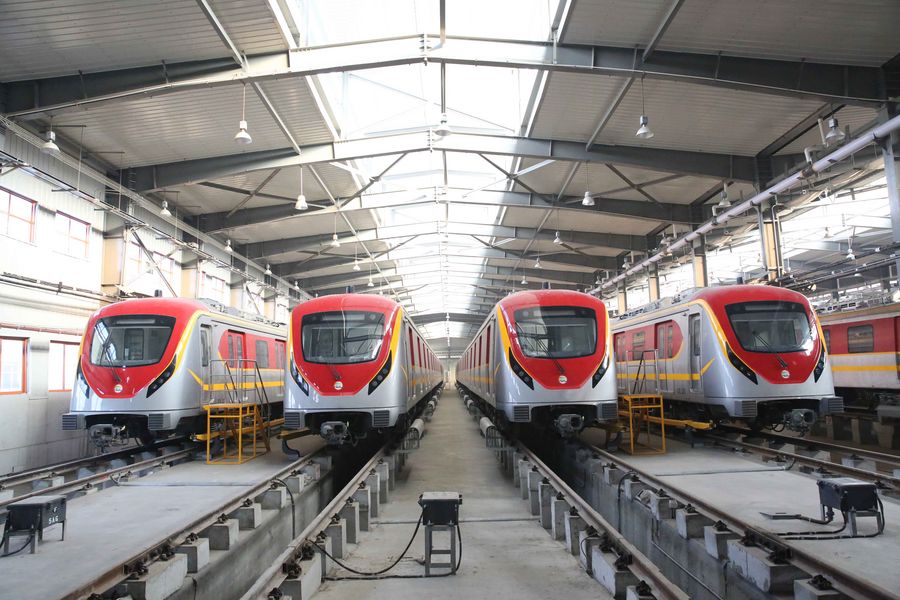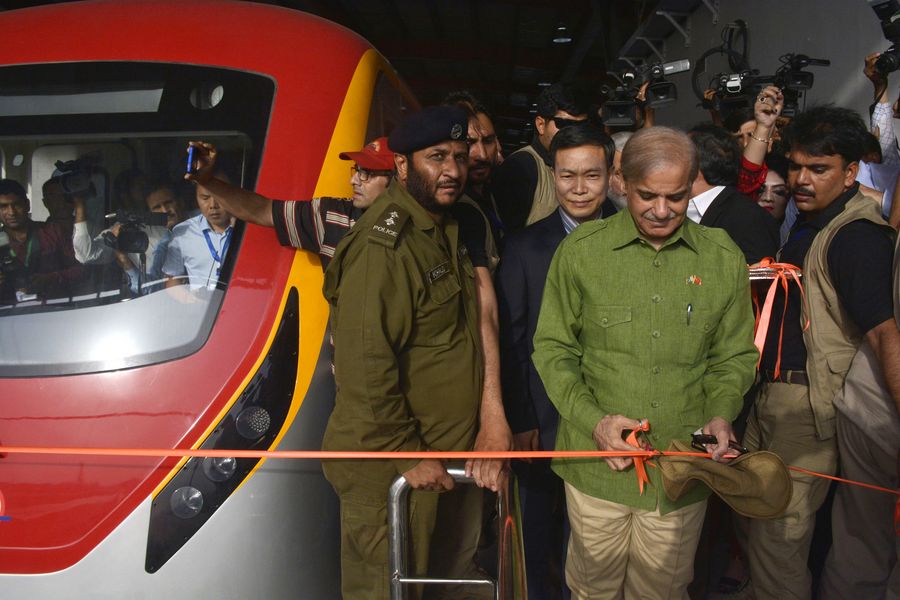
Trains of the metro train service are seen at a terminal station in Lahore, Pakistan, on Dec. 10, 2019. (Xinhua/Liu Tian)
A Pakistani scholar said the newly launched train service will reduce associated time delays, fuel consumption, conflicts and accidents, air pollution and noise.
The train service is expected to handle about 250,000 passengers daily when fully operational, according to the official.
ISLAMABAD, Dec. 20 (Xinhua) -- Pakistani experts are of the view that the country's first-ever mass rapid urban transit train under the China-Pakistan Economic Corridor (CPEC) will help Pakistan to revitalize its economy and transportation system while mitigating environmental woes.
Pakistan inaugurated the test run of the Orange Line Metro Train (OLMT) last week in Lahore, the capital city of the country's eastern Punjab province. The project is funded by the Export-Import Bank of China as part of CPEC, and is expected to be fully operational in the first half of 2020, according to Pakistani officials.
In a conversation with Xinhua, Zafar Mahmood, professor of economics at the National University of Sciences and Technology in Islamabad, said that the project would contribute towards Pakistan's transportation industry Gross Domestic Product (GDP) and ultimately the national GDP.
It will, directly and indirectly, create many business and employment opportunities in Lahore which is the second most populous city of Pakistan, with a population of over 10 million, he said.

Commuters are seen amid heavy smog in Lahore, eastern Pakistan, on Nov. 15, 2019. (Photo by Sajjad/Xinhua)
"Fast connectivity is extremely important to become efficient and competitive. The OLMT and other metro projects will make the city efficient in the provision of services by increasing time efficiency and hence reduction in financial costs," Mahmood added.
He said transportation is a big issue in the city due to the lack of public transport facilities, and most of the day residents have to wait for long hours to reach workplaces and other destinations, and go back home, which is hazardous for health and social life.
"The project will be a hallmark in the transport industry of Pakistan by providing state of the art technology and facilities to Pakistan and its citizens," the expert said, adding that its success will attract other foreign investors to come to the country not only in the transport sector but also in other sectors of the economy.
A total of 27 sets of energy-saving electric trains, each consisting of five fully air-conditioned carriages, will operate between 26 stations, General Manager of the Punjab Masstransit Authority Uzair Shah said during the test run ceremony of the OLMT on Dec. 10.

Passengers are seen on an overcrowded bus ahead of the Eid al-Adha festival in Lahore, Pakistan, on Aug. 11, 2019. (Photo by Jamil Ahmed/Xinhua)
The train service is expected to handle about 250,000 passengers daily when fully operational, according to the official, adding that three rail lines including the OLMT under Lahore Metro master plan are expected to carry half a million passengers a day by 2025 after completion.
Vaqar Ahmed, joint executive director at the Sustainable Development Policy Institute of Pakistan, told Xinhua that Pakistan's economy requires significant transport and logistics uplift to improve mass transit and movement of goods, and the OLMT will be an important step in this direction.
"There will be some transfer of technology, know-how and management practices in the transport sector," Ahmed said, adding that the experience gained by Pakistani engineers and support staff from the OLMT would put them on the learning curve to be used in similar projects in the future.
"Pakistani engineers learned much from the Karakoram Highway and other infrastructural projects in the country implemented with Chinese assistance, which enabled Pakistan to launch many other projects on the basis of experience gained from earlier projects," he added.

Shahbaz Sharif (2nd R, front), chief minister of Pakistan's Punjab province, inaugurates the test run of the Orange Line Metro Train (OLMT) in eastern Pakistan's Lahore, on May 16, 2018. (Xinhua/Sajjad)
The OLMT is expected to provide fast and much better transport facilities to the commuters, who will soon see less traffic pressure on the roads. Diversion of traffic from existing road networks will improve the condition of existing roads and apparatus, ultimately saving for the exchequer, the economist said.
Farzana Yasmin, a Pakistani scholar undertaking environmental and urbanism research at the Katholieke Universiteit Leuven, Belgium, said that an efficient mass transit system was indispensable to meet the commuters' needs and for Pakistan's inclusive and smart cities to achieve sustainable development goals.
"The newly launched train service will reduce associated time delays, fuel consumption, conflicts and accidents, air pollution and noise. Smooth flow of traffic will also help in lesser wear and tear of vehicles," Yasmin told Xinhua.
She said with the metro train service, there will be a potential decrease in carbon emission and exhaust of vehicles that will help to deal with the on-going smog issue and noise pollution in Lahore.
"The project will also improve the image of Pakistan in the eyes of the world when foreign tourists visit Lahore and avail this facility," she added. ■



